Arizona has sandy vistas and an arid climate, placing it among the best states for hiking. One destination for this outdoor activity is the Superstition Mountains in the Sonoran Desert. Located less than an hour from Phoenix next to Lost Dutchman State Park, the Superstition Mountains are part of the Tonto National Forest.
The volcanic mountain range has several hiking trails in the 160,200-acre Superstition Wilderness Area. This includes the 4.4-mile roundtrip Peralta Trail, which provides hikers with a viewing point of Weaver’s Needle, a pointy volcanic rock structure. Another option, the 3-mile roundtrip Hieroglyphic Trail, leads hikers to rock carvings created by the Hohokam, a pre-Columbian indigenous group. However, the Superstition Mountains also hold peril and mystery.
In a 2015 interview with The Arizona Republic, the late George Johnston, president emeritus of the Superstition Mountain Museum, stated that in the 19th century, farmers labeled the range the Superstition Mountains after they were told by the local Pima population that they had a sense of trepidation about them. They cited disappearances, amongst other concerning occurrences. Johnston explained to the publication, “There do seem to be more disappearances here, than on other mountains.” He added, “On average, about four to five hikers die each year.” Sadly, one of the reasons for this appears to be a story about hidden gold.
The lost souls of the Superstition Mountains

The Superstition Mountains are located in the same area as Lost Dutchman State Park. The name of this park comes from a legend that states that in the late 1800s, a German immigrant named Jacob Waltz (aka the Dutchman) found a gold mine in the Superstition Mountains. The mine was said to be owned by the Peraltas, a family from Mexico. Apache members reportedly killed the Peraltas, and thus, the gold mine was lost until Waltz somehow rediscovered it. Before he died in 1891, Waltz is said to have attempted to provide directions to what is now known as the Lost Dutchman’s Gold Mine but ultimately failed. Lore states that the mine is still out there, prompting hikers to search the rough terrain with deadly consequences.
In 2010, three ill-prepared hikers from Utah, Curtis Merworth, Ardean Charles, and Malcolm Meeks, went to the Superstition Mountains to look for the mine and went missing. The bodies of Charles and Meeks were not found until January 2011. A body believed to be Merworth’s was discovered that same month. The three were said to have died of hypothermia, according to Cowboys & Indians. In late 2009, Jesse Capen, a man from Denver intent on finding the gold mine, disappeared in the Superstition Mountains. Capen’s remains were located in 2013, and it’s believed he died after falling off a cliff. Although he was not looking for gold, Arizona local Khayman Welch disappeared in the Superstition Mountains in 2020 and has not been seen since.
Don’t make rookie hiking mistakes in the Superstition Mountains

Hiking the Superstition Mountains is not for amateurs. Getting lost (and found) or hurt is common among hikers. In one case (via 12News), two hikers spent the night in the mountains in 2016 when they lost their way due to damaged trail markers. They were discovered unharmed the next day. With that said, if you plan on hiking the Superstition Mountains, stay hydrated and bring enough water.
Note that temperatures can soar up to the triple digits in the summer months. Wearing sun protection and layering clothing is vital. Likewise, visiting the Superstition Mountains during the spring is recommended to enjoy mild climates and seasonal blooms. To avoid becoming one of Superstition Mountains’ missing persons, stick to hiking marked trails and make sure that your cell phone is fully charged (or bring an external battery) in case you need to call for help. Packing food, a first aid kit, and extra clothing wouldn’t hurt in case temperatures get chilly.
It goes without saying that you should refrain from looking for the alleged Lost Dutchman’s Gold Mine. However, you can visit the Superstition Mountain Museum to learn more about the legend. It has exhibits, artifacts, and more that focus on local history. Tickets range from $4 to $7, and the museum is open daily from 9 a.m. to 4 p.m. from April through October and 9 a.m. to 3 p.m. May through September.

